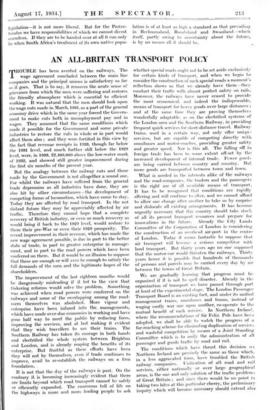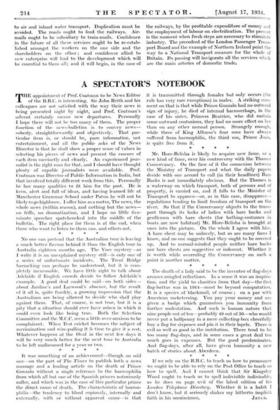AN ALL-BRITAIN TRANSPORT POLICY
TROUBLE has been averted on the railways. The wage agreement concluded between the main line companies and the principal unions is satisfactory so far as it goes. That is to say, it removes the acute sense of grievance from which the men were suffering and restores the friendly atmosphere which is essential to efficient working. It was natural that the men should look upon the wage cuts made in March,1931, as a part of the general economy drive which in the same year forced the Govern- ment to make cuts both in unemployment pay and in wages. They assumed that the same conditions which made it possible for the Government and some private industries to restore the cuts in whole or in part would affect them also ; and they were fortified in this view by the fact that revenue receipts in 1933, though far below the 1931 level, and much further still below the 1929 level, were, in 1938, £2,400,000 above the low-water mark of 1982, and showed still greater improvement during the first six months of the present year.
But the analogy between the railway cuts and those made by: the Government is not altogether a sound one. For whilst the railways have suffered from the general trade depression as all industries have done, they are also hit by other circumstances—the development of competing forms of locomotion, which have come to stay. Today they are affected by road transport. In the not distant future they may be appreciably affected by air traffic. Therefore they cannot hope that a complete recovery of British industry, or even so much recovery as would bring it back to the 1929 level, would restore to them their pre-War or even their 1929 prosperity. The recent improvement in their revenue, which has made the new wage agreement possible, is due in part to the better state of trade, in part to greater enterprise in manage- ment, and in part to the road powers which have been conferred on them. But it would be an illusion to suppose that these are enough or will ever be enough to satisfy the full demands of the men and the legitimate hopes of the shareholders.
The improvement of the last eighteen months would be dangerously misleading if it led to the view that tinkering reforms would solve the problem. Something was achieved when road powers were conferred on the railways and some of the overlapping among the road- users . themselves Was abolished. More vigour and enterprise have been infused into the , managements, which have made over-due economies in working and have gone half way to meet the public by reducing fares, improving the services, and at last making it evident that they wish travellers to use their trains. The Southern Railway has taken its courage in both hands and electrified the whole system between Brighton and London, and is already reaping the benefits of its enterprise. But fruitful as these efforts have been they will not by themselves, even if trade continues to improve, avail to re-establish the railways on a firm foundation. .
It is not that the day of the railways is past. On the contrary it is becoming increasingly evident that there are limits beyond which road transport cannot be safely or efficiently expanded. The enormous toll of life on the highways is more and more leading people to ask whether special roads ought not to be set aside exclusively for certain kinds of transport, and when we begin to consider the construction of such special roads a moment's reflection shows us that we already have them—they conduct their traffic with almost perfect safety on rails. Moreover, the railways have never ceased to provide the most economical. and indeed the indispensable, means of transport for heavy goods over large distances ; and at the same time they are proving themselves wonderfully adaptable. as on the electrified systems of the London area and the Southern Railway, in providing frequent quick services for short-distance travel. Railway trains, used in a certain way, not only offer uniquit services, but are capable of competing directly with omnibuses and motor-coaches, providing greater safety and greater speed. Nor is this all. The falling off in foreign trade has been to some extent off-set by the increased development of internal trade. Fewer goods are being carried between country and country. But more goods are transported between town and town.
What is needed in the interests alike of the railways and the road-companies. the traders and the passengers is the right use of all available means of transport. It has to be recognised that conditions arc rapidly altering and will continue to alter, and we cannot afford to allow one change after another to take us by surprise and dislocate all existing arrangements. It has become urgently necessary that this country should take stock of all its present transport resources and prepare for innovations in the future. Already the City Lands Committee of the Corporation of London is considering the construction of an overhead air-port in the centre of London. Today it seems fantastic to suppose that air transport will beconv." a serious competitor with land transport. But thirty years ago no one supposed that the motor-car would threaten the railways. Thirty years hence it is possible that hundreds of thousands of persons and parcels may be carried every day by air between the towns of Great Britain.
We are gradually learning that progress must be organized if it is not to spell disaster. Already in the organization of transport we have passed through part at least of the experimental stage. The London Passenger Transport Board is an existing fact, and under its unified management trains, omnibuses and trams, instead of waging costly war one upon another, co-operate to the mutual benefit of each service. In Northern Ireland, where the recommendations of Sir Felix Pole have beea adopted, we shall be able to watch the progress of a far-reaching scheme for eliminating duplication of services and wasteful competition by means of a Joint Standing Committee which is to unify the administration of all passenger and goods traffic by road and rail.
The conditions which have thrust this decision osi Northern Ireland are precisely the same as those which, in a less aggravated form, have troubled the British railway companies. Unification of all road and rail services, either nationally or over large geographical areas, is the one and only solution of the traffic problem ; of Great Britain ; and since there would be no point in taking two bites at this particular cherry, the preliminary inquiry which will become necessary should extend also
to air and inland water transport. Duplication must be avoided. The roads ought to feed the railways. Air- mails ought to be subsidiary to train-mails. Confidence in the future of all these services ought to be re-estab- lished amongst the workers on the one side and the shareholders on the other ; and confidence allied to new enterprise will lead to the development which will be essential to them all; and it will begin, in the case of the railways, by the profitable expenditure of money and the employment of labour on electrification. The present is the moment when fresh steps are necessary to stimulate industry. The precedent of the London Passenger Trans- port Board and the example of Northern Ireland point the way to a National Transport measure for the whole of Britain. Its passing will invigorate all the services which are the main arteries of domestic trade.



































 Previous page
Previous page